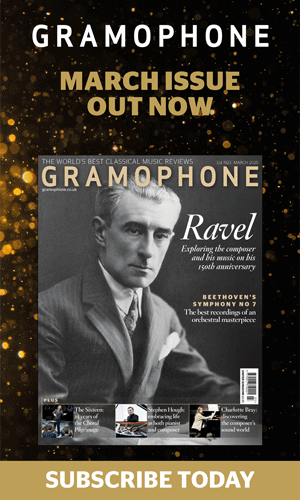Recording a gas shell bombardment on the Western Front in 1918 | Gramophone Archive
Thursday, November 11, 2021
The brave attempt to capture the sound of war on the Western Front in the Autumn of 1918 ended in tragedy for sound recordist WC Gaisberg, as this extract from Gramophone's archive reveals

At least three more attempts to make 'live' recordings were made during the acoustic era. The first – though it came later to be published in the usual way – proved the cause of a fatality. It was the Autumn of 1918. The Great War was ending, and the Armistice in sight. During the final days of fighting The Gramophone Company sent its chief recordist, WC Gaisberg (brother of the subsequently more famous Fred) to the Front, with instructions to capture the sounds of one of the last gas shell bombardments. Thus the terrible noise of 'the war to end war' would be preserved for the horror and awe of posterity. Gaisberg arrived with his equipment and a military pass, and moved closer and closer to the front lines. His opportunity came as the battle seemed almost to break over him, and he got his recording. But he was severely gassed in the process, and returned home a very sick man. His weakened condition made him a quick victim of the great influenza epidemic of November 1918, and within a month of making the record he was dead.
‘As the dense crowds in the Abbey sang the designated hymns, there was an attempt to make a recording over telephone lines’
The war years had seen important developments in telephonic communication, and this for a moment seemed to promise a contribution to 'live' recording. On Armistice Day 1920 Westminster Abbey was the scene of an impressive ceremony. It was the Burial of the Unknown Soldier. As the dense crowds in the Abbey sang the designated hymns, there was an attempt to make a recording over telephone lines. It was in a sense the first electrical recording, and it was actually issued by Columbia for a brief period as an appeal to charity. But telephone sound was never of good fidelity, and the musical results were dismal beyond belief. If that disc had any influence on the coming of electrical recording it must have been to delay it.
Wireless also made its own contribution. On April 23, 1924, the BBC broadcast the opening ceremony of the British Empire Exhibition at Wembley. Speeches by both the King and the Prince of Wales were included, and there was some new music especially written for the occasion and conducted by Sir Edward Elgar. The Gramophone Company recorded much of this direct from the wireless receivers into their acoustic recording machines, but the results were considered so hopeless that the records were unfortunately destroyed.
Jerrold Moore, Gramophone, April 1972
Welcome to Gramophone ...
We have been writing about classical music for our dedicated and knowledgeable readers since 1923 and we would love you to join them.
Subscribing to Gramophone is easy, you can choose how you want to enjoy each new issue (our beautifully produced printed magazine or the digital edition, or both) and also whether you would like access to our complete digital archive (stretching back to our very first issue in April 1923) and unparalleled Reviews Database, covering 50,000 albums and written by leading experts in their field.
To find the perfect subscription for you, simply visit: gramophone.co.uk/subscribe








